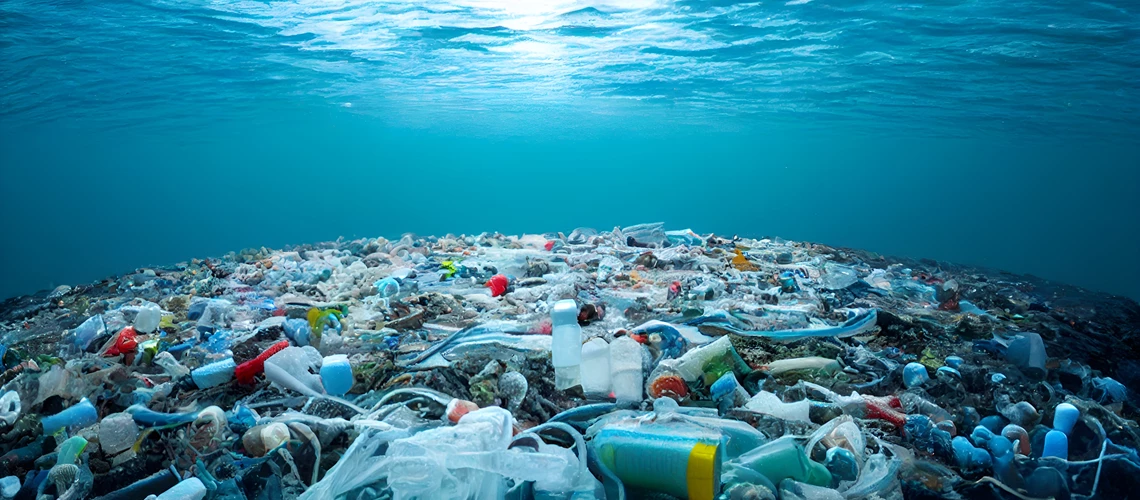 Photo: mbala mbala merlin/iStock
Photo: mbala mbala merlin/iStock
This week, as the world marks Earth Day, the global community is highlighting the pressing issue of plastic pollution. The annual flow of plastic into the ocean is expected to nearly triple by 2040, posing a serious global development challenge. The international community is confronting the issue with a series of Intergovernmental Negotiating Committee (INC) sessions dedicated to negotiating an international legally binding instrument on plastic pollution, including in the marine environment. Known informally as a global plastic pollution treaty, the goal is to complete this work by the end of 2024.
The INC negotiating sessions are important platforms to discuss and debate the scope of the anticipated plastics treaty, technical elements, and means of implementation. Today, an expected 4,000 representatives from the UN Member States and observers will be attending the fourth session (INC-4) in Ottawa, where financing will be one of the key issues discussed. Questions on the table will include how to finance the actions needed for the required plastic transition, how to reduce the most problematic and unnecessary plastic uses, and how to ensure that funds reach the most vulnerable countries.
Several organizations are undertaking analytics to inform this set of questions. Recent estimates are that US$1.64 trillion will be required by 2040 to beat plastic pollution. These figures reveal that national budgets are falling short, and a systems change will require significant public and private financial resources, including innovative financing, and a large-scale redirection of financial flows.
Recent estimates are that US$1.64 trillion will be required by 2040 to beat plastic pollution.
The allocation of financing has to respond to the need. A recent OECD report compares development finance with data on plastic leakage, and highlights that some regions should be more highly prioritized. Redirection of investments will be required to support upstream solutions, including reuse and refill systems for packaging and products.
The role of the public sector is crucial to maintain fair market conditions. Financing waste management systems is a major concern for municipalities, with operational expenditures being the greatest hurdle. International public finance is also key, with institutions like the World Bank having pipeline projects of over US$2.5 billion, with components focused on plastic pollution prevention, marine litter, and waste management. The World Bank is supporting client countries with analytics, policies, and investment preparation including through PROBLUE, a multi-donor trust fund that promotes the sustainable development of marine and coastal resources. More than US$50 million of PROBLUE funds have been allocated to over 100 activities across 60 countries to assist governments in identifying and implementing actions to address plastic pollution.
More than US$50 million of PROBLUE funds have been allocated to over 100 activities across 60 countries to assist governments in identifying and implementing actions to address plastic pollution.
Private capital is critical for success in tackling plastic pollution and must be accessible at the right price and with appropriate targeting. Alongside the negotiations, initiatives like the Business Coalition have mobilized over 200 companies who are calling for common, global rules related to restrictions and phase-outs; reuse policies; product design requirements; extended producer responsibility, and waste management. Institutions like IFC are helping to develop markets, advise firms, and crystalize opportunities to tackle plastic pollution. The Circulate Initiative developed an investment tracker that analyzed over 3,700 transactions across 91 countries over five years, revealing an annual investment in global plastics circularity of approximately US$29 billion which, while encouraging, falls below what is required for a systems change.
The financial sector can play an important role in narrowing this gap. Just last week, under the auspices of UNEP FI, 160 financial institutions, representing a combined asset total of US$15.5 trillion, called on governments for an ambitious to enable private finance sector to play its role.
There are also various efforts at exploring innovative means of mobilizing finance at scale. Some stakeholders have proposed a plastic pollution fee to be levied on primary plastic production. This fee is proposed as an innovative financing tool to support implementation, and as an economic instrument to support possible control measures.
Investors are increasingly focused on outcome-based financing which links payments to concrete, measurable results to tackle plastic pollution. In January this year, the World Bank introduced the world’s first Plastic Waste Reduction-Linked Bond providing investors with a financial return linked to plastic credits and carbon credits expected to be generated by two collection and recycling projects in Ghana and Indonesia.
In January this year, the World Bank introduced the world’s first Plastic Waste Reduction-Linked Bond providing investors with a financial return linked to plastic credits and carbon credits expected to be generated by two collection and recycling projects in Ghana and Indonesia.
INC-4 discussions will also extend to the structure of the potential financing mechanism for the eventual plastics treaty—whether it should be a new dedicated one, existing, or a hybrid. As countries navigate these options, a wealth of insights awaits from numerous agencies, drawing from their background and experiences.
With the true costs of plastic pollution now undeniable, the World Bank Group stands ready to roll out innovative financing solutions to support our clients and partners in implementing the results of this international effort, as highlighted as one potential approach in the Revised Zero Draft. Together, we can #BeatPlasticPollution.




Join the Conversation